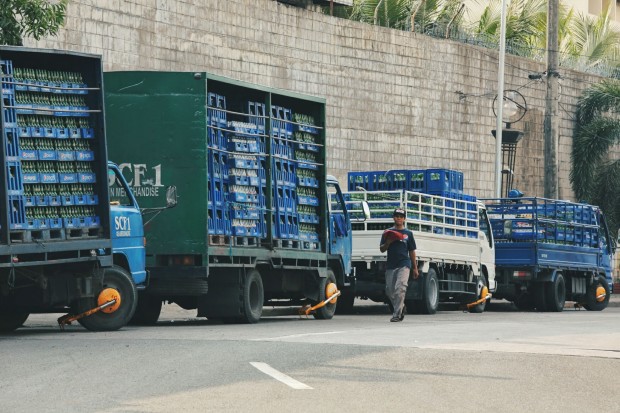All trucks will be banned from using Metro Manila’s Skyway starting Nov. 15, 2016 in an effort to improve road safety and speed up the flow of traffic on the elevated toll road and the soon-to-be-opened NAIA Expressway.
Skyway O&M (Somco)—the operator of the Skyway system—said that a recent consultative meeting with barangay (village) officials, local police, highway patrol units, mall owners and other stakeholders determined that it was unsafe for trucks to use the elevated road, since they pose potential risks to other road users.
This was reinforced by two recent major accidents involving delivery trucks of a beverage company which were reported along the Skyway elevated section, causing heavy traffic along the busy thoroughfare.
READ: Skyway accident raises anew concerns over safety standards
“Together with Somco, we agreed to implement tighter restrictions as far as road safety is concerned,” Police Senior Inspector Leopoldo M. Vitug Jr. who is responsible for the NCR-Skyway system. “The welfare of the motorists and passengers should always be our priority.”
READ: Car hangs on Skyway guardrail after road accident
He said, however, that heavy vehicles carrying essential commodities would be exempted from the ban, although their entry will be regulated to ensure that they meet the safety requirements to use the elevated road.
At the same time, Somco also pointed to long queues of buses, public utility vehicles (PUVs), UV Express vans and trucks at toll entry and exit points as being largely responsible for traffic buildup on the elevated and at-grade sections of the Skyway system.
To address this, PUVs and trucks will be required to use radio frequency identification (RFID) stickers for faster toll processing, as proposed by various stakeholders during the same traffic meeting, Somco said.
The RFID toll collection system—a cashless transaction already in place and used by mostly private vehicles—is meant to minimize queuing time for trucks and PUVs at toll plazas.
By reducing or totally eliminating the time drivers consume for collecting cards, preparing and paying toll and counting change, RFIDs can help reduce vehicular congestion especially during peak hours, Somco said.
RFID stickers are given to motorists free of charge. No payment or fee required to install it on vehicles, Somco said, adding that users only need to initially load P500 for class 1 vehicles and P1,000 for class 2 vehicles.
Faster traffic flow would benefit not only other motorists, but also passengers of PUVs, their drivers and operators, as well as truck owners and their business clients.
According to Somco, the daily average number of vehicles using the Skyway system has risen from 180,000 in 2015 to around 200,000 this year.
SOMCO also identified 128 “traffic conflicts” at the Bicutan interchange and 80 in Sucat, Paranaque, which it said it has started to resolve.
Other measures proposed at the meeting include the removal of illegal public utility jeepney terminals at SM Bicutan, and the transfer of PUV parking areas along the Sucat northbound entry to the Posadas area, on the east and west service roads.
Improved coordination with Maynilad regarding its ongoing project on Sucat Road, the opening up of alternate routes in subdivisions and clearing the streets of vendors, are also among measures being considered. RAM/rga
